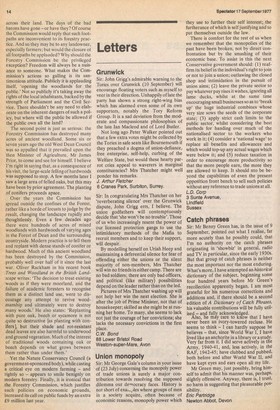Forestry madness
Humphrey Phelps
In 1919 the Forestry Commission was instituted in order to grow timber 'sufficient to meet the essential requirements of the nation over a limited period of three years in time of war or national emergency.' Since then it's been given further objectives, including 'certain powers to control felling', and 'to give due attention to the aesthetic and productive roles of the forest and to encourage open-air recreation.'
Today the Commission, unlike most government • departments, is favourably regarded, especially by itself and other official bodies — and by a great many people who would vigorously protest if any private landlord behaved in a manner similar to the Commission. The Commission has not been Without critics in the past because of its felling of broad-leaved trees, turning our countryside into an alien land by the dense and vast plantations of conifers, and by its treatment of the sheep farmers on the Welsh hills. But now it basks in the approbation of its open-air recreation facilities, its way-marked paths and its concern for con servation. _ I live near the Forest of Dean which the Commission took over in 1926. It is true that the -Commission plays host to tens of thousands of visitors every year. Only the local inhabitants are barred from the forest. I have in front of me a cutting from our local newspaper, the Dean Forest Mercury, of 27 May: 'Councillors will tour the Dean and protest' about the 'continued infringements of freedom in the forest.' Councillor F. C. Beard spoke of the Commission's 'continued policy of fencing off parts of the forest and blocking of roads.' Councillor F. R. Davies drew attention to the tree felling. 'The beautiful forest we enjoyed so much is being despoiled', he said. 'Felling has taken place along all roads out of Coleford and the brushwood has been left. To my mind it's disgusting.' Many local people would agree, especially about the Commission's despoilation at thp Speech House, the very heart of the Forest.
There are two specific complaints here. There is, first, the infringement of freedom: from ancient times the Crown and Parliament had protected the Forest of Dean against encroachment; statutes of 1667, 1808 and 1838 reiterated that this area should be held for the Crown in perpetuity for the public good. Such encroachment as occurred at the end of the eighteenth century did not effect this policy; the government accepted the situation but insisted that the Forest of Dean should not be sold or leased in any part to any private individual. In 1961 and 1971 these Acts were repealed. Since then, the Land Agent of the Forestry Commission has been selling land to private persons, land that is a national heritage and has always been open to the public.
Recently the Commission's agent has objected to almost every public footpath on the draft map prepared by the local authority, not only in the Forest of Dean but on other land held by the Commission. They are, in fact, saying that no one has a right of access to these woodlands except by privilege. If they're allowed to get away with this, it will mean that the public's right of access to the Forest no longer exists, and any government would be able to sell off, fence off, or do what it liked with any of this land, and there would be no defence against it.
No private landowner today would behave in such a dictatorial manner, and no private landowner would be allowed to do so. But I don't suppose many private landowners today would wish to oppose the principle of long-established rights of way across their land. The days of the bad barons have gone —or have they? Of course the Commission would reply that such footpaths are inconvenient to its forestry practice. And so they may be to any landowner, especially farmers; but would the closure of all footpaths be applauded? Why should the Forestry Commission be the privileged exception? Freedom will always be a nuisance to someone. What makes the Com mission's actions so galling is its san timonious attitude. Publicly it is applauding itself, 'opening the woodlands for the public.' Not so publicly it's taking away the rights of the local inhabitants, backed by the strength of Parliament and the Civil Ser vice. There shouldn't be any need to elaborate on the inherent dangers of such a policy, but where will the public be allowed if the public own all the land?
The second point is just as serious: the Forestry Commission has destroyed many acres of ancient woodland. Some six or 'seven years ago the old West Dean Council was so appalled that it prevailed upon the 'then Minister of Agriculture, Mr James Prior, to come and see for himself. I believe I'm right in saying that, as a consequence of his visit, the large-scale felling of hardwoods was supposed to stop. A few months later I ,saw a large area of felled oaks, but this may have been by prior agreement. The planting of conifers proceeds apace.
Over the years the Commission has spread outside the confines of the Forest, rather like a horde of locusts to judge by the ,result, changing the landscape rapidly and thoughtlessly. Even a few decades ago there were hundreds of acres of' mixed woodlands with hardwoods of varying ages in the Forest of Dean and the surrounding countryside. Modern practice is to fell them and replant with dense stands of conifer or hardwood. Much of this ancient woodland has been destroyed by the Commission, probably well over halt' of it since the last war. Oliver Rackham in his recent book Trees and Woodland in the British Landscape writes: 'The decision to treat existing woods as if they were moorland, and the failure of academic foresters to recognise them as a distinct land use, were to discourage any attempt to revive wood.manship and ultimately were to destroy many woods.' He also states: 'Replanting with pure oak, beech or sycamore is not .quite so destructive [as planting with conifers), but their shade and rot-resistant dead leaves are also harmful to underwood and ground vegetation. Much of the interest of traditional woods containing oak or beech depends on what grows between them rather than under them.'
. Yet the Nature Conservancy Council (a government-sponsored body), while casting a critical eye on modern farming — and rightly so — appears to smile benignly on modern forestry. Finally, it is ironical that the Forestry Commission, which justifies such policies on economic grounds, increased its call on public funds by an extra £9 million last year.































 Previous page
Previous page